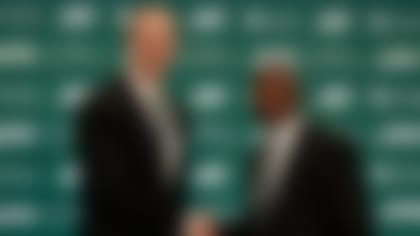In his robust Inside The NFL Notebook, NFL Media's Albert Breer touches on multiple topics, including (click on each link to take you directly to the topic):
» Joe Philbin's steady-as-he-goes style in Miami.
» The secret of the Seahawks' strength.
» A breakdown of the Bucs' quarterback situation.
» And much more, beginning with a closer look at where the NFL stands abroad ...
The NFL's move to two games in London for this fall was about growth.
If the league goes to three games anytime soon, it'll be about ambition.
Those two motivators can explain where we are with the NFL's International Series project, as the seventh game approaches and the eighth matchup looms just one month away.
The growth of the league in the United Kingdom since 2007 has been significant, but not to the point where those running the show over there believe relocating a franchise to London or having an expansion team is on the foreseeable horizon.
And there's the rub. The guys in charge of growing American football in Europe don't run the league. The 32 owners do, and there is a subset among them fascinated with putting a team on the other side of the Atlantic, not just to open new profiting-bearing doors but to burnish legacies.
Robert Kraft outed himself as a member of that group last year, when the New England Patriots owner said he wanted a team in London within 10 years, a number that now is down to nine. Kraft's ambition is clear. The growth hasn't caught up with the vision yet, but ultimately, the decision to push forward with a team overseas will be up to him and his brethren, whether the UK is ready or not.
"I'll be honest, we don't sit around and debate that," Chris Parsons, the NFL's senior vice president of international, said before this week's Pittsburgh Steelers-Minnesota Vikings matchup. "If you ask me that question of when, it'd be total speculation on my part. I think you have to remember that we at the league don't necessarily make those decisions either. We've got 32 teams. We have 32 homes. It works well this way, and we'll see if the 32 owners want to change that.
"My personal ambition, for now, is to build a fan base in the UK, and if that provides that kind of opportunity in the future, then great. But for us, it's not some big end game."
Kinkhabwala: London football, A to Z
It took steady growth to get the project where it is now.
Parsons reported that since the league started with the Miami Dolphins and New York Giants at Wembley Stadium -- and it was a sloppy start, if you remember, as rain and a field built for soccer left the teams playing in a virtual swamp -- the UK fan base has grown by more than 2 million, a significant number in a country of 63 million, with half of those fans having become "avid."
According to the league's numbers and research done through Sky Sports ratings, American football is comfortably in the UK's top 10 sports in popularity, ranking sixth or seventh, in with motorsports and darts. Soccer tops that list, with cricket, rugby and tennis in the No. 2 through 4 spots, and golf at No. 5.
It has been the NFL's belief that to even consider entertaining a full-time franchise in London, American football would have to rank in the top five in the UK. Yes, it's close now, but getting to the level of cricket, rugby and tennis won't be easy. That's why, from Parsons' perspective, a methodical approach is best.
The early signs are good. Parsons was very surprised with the demand for tickets and how quickly the two 2013 games sold out. "We got a statement from the fans," he said.
The NFL responded by expanding its annual fan fest into an event that'll close over a mile of Regent Street (the rough equivalent of Fifth Avenue in New York) on Saturday, from Piccadilly Circus to Oxford Circus, with a half-million people expected to pass through. And this year, Parsons said the opportunity is there to tell the NFL story between the two games, then continue it on British television into the playoffs.
After that, the league's plan is to take a step back.
"We want to make sure we evaluate the impact of having two games first," Parsons said. "We're not going to keep doing it if we don't have the impact we're looking for. Now, if we have a good experience with the two, we'd like to have two games next year, and the question is whether we can play more than two. You also have to have teams that want to participate. The more fans we get, the more confident we get, the more opportunity we'll have to bring the real game."
Remember, it took six years to add a second game. Adding a third soon would be, well, kind of quick.
For all the progress, there's still a long way to go. Media coverage has increased, but the game hardly is front-page news in England. Last year, the fact that Gisele Bundchen's husband was in town was a bigger hook as a storyline than the fact the guy in question (Tom Brady) is a pretty prominent player for a pretty important team in the game.
Additionally, the UK isn't even the NFL's strongest international market -- or even close. USA Football numbers show that Canada, Mexico and Japan sit on a second tier, and Germany, Austria and France are on the third tier, with the UK behind that.
But because of the marketplace, the business opportunities, the proximity, the logistics of TV distribution and the lack of a language barrier, London has become the NFL's guinea pig, with the league committed to getting it right there before using the blueprint elsewhere. The NFL has an exclusive deal with Wembley Stadium through 2016, which means all its games in the UK must be played there and that the league probably won't look elsewhere globally until at least 2017.
All this will make the next few years interesting. The league now has three owners who also own Premier League teams (Stan Kroenke, Shad Khan, Malcolm Glazer), and one of those owners, Khan, has committed his club, the Jacksonville Jaguars, to playing in London this year and each of the next three years. Khan's investment in the UK should bolster the NFL's efforts, since he's deploying staff members and resources overseas to make it work.
Then there's that word again -- ambition.
After all, whether or not London is ready to have an NFL team won't be decided on a pie chart or bar graph, or through some mathematical equation. It'll be decided by 32 men who've seen their sport grow to a saturation point domestically and who, as titans of industry, always are looking for ways (see: 18 regular-season games) to expand outside the box from which they operate.
So Parsons and the NFL really are like the rest of us on this one: Waiting to see what happens next.
"I don't think we've come at it (with the sole focus of getting a team in London)," Parsons said. "There are real benefits to getting scale of the sport in the UK. It's a big sports market. It's a big rights market. We think our sport has had success, and there's potential for a lot more. We haven't necessarily said, 'We have to have a team here.' "
To be clear, Parsons and those at the league office haven't said that. But it's a fair bet to think a few other people have.
Breaking down the Aldon Smith situation
The San Francisco 49ers' decision to play Aldon Smith last week after a second DUI-related arrest might have come down to answering a yes-or-no question, but the complexities that went into the final call highlight an organization that was a bit conflicted on its approach.
San Francisco knew that deactivating Smith, even if it chose to pay him for the game, would lead to a grievance from the NFL Players Association because of the union's resolve to prevent a bad precedent. The 49ers weren't going there. And so given that they'd dress Smith out for the game, the question became how much he'd play.
Brandt: Teams in the danger zone
Gil Brandt takes a look at seven teams that surprisingly have struggled out of the gate in 2013. Time to hit the panic button? **READ**
Right or wrong, the 49ers decided it would be unfair to Smith's 52 teammates to go into the game short a roster spot; this meant he would be available to the coaches in some capacity. My understanding is some inside the organization preferred to limit Smith's role, to a) send the right message and b) prepare for the looming extended period without him. In the end, defensive coordinator Vic Fangio and the staff played Smith every snap; on Monday, Smith checked himself into rehab.
That part is in the books. The next step might be just as complicated.
An NFC personnel executive, an AFC college scouting director and an AFC area scout all used the same word -- "immature" -- to describe Smith's reputation coming out of Missouri in 2011. Most chalked his problems up to, as the college scouting director put it, "being 20 years old. He was just young."
There was no out-of-the-ordinary substance issue at Mizzou. Accordingly, the 49ers' belief is that Smith's more serious problems came about after he entered the league. That might be why even San Francisco's strong player program department -- which supported guard Alex Boone as he dealt with alcoholism -- couldn't help.
Simply, Smith had a lot on him for a guy in his early 20s. With his family and especially with the recent birth of a daughter, he was thrust into the role of provider. Issues with trust (he isn't particularly close with many people) and sleep ensued, and he didn't handle all of it particularly well.
The 49ers will let the process play out for Smith. The expectation is that he'll be in rehab for a minimum of three to four weeks. One team official said that, when Smith returns, "I think the players see that now they have to be his family more than being a buddy." The 49ers will try to get friends Ray McDonald and NaVorro Bowman, mentor figure Justin Smith and Boone to be active with Smith.
Battista: No cakewalk for Denver

Judy Battista breaks down what's shaping up to be a race that few saw coming, plus provides 10 things to watch in Week 4. **READ**
Per the above timeline -- and assuming it'll take a couple of weeks to get Smith back into football shape after the dust settles -- the 49ers expect to be without him for a minimum of five weeks. Just as they got approval from NFL Commissioner Roger Goodell to put Smith on the non-football injury list, they'll need approval to remove him from it, and that likely will require the blessing of Smith's rehab facility.
The feeling is that Smith eventually will face a two- to four-game suspension, though that won't be assessed until after his DUI case makes it through the court system, which might not happen for a few months or even until the offseason. Smith could later argue that his rehab stint should count as time served.
Either way, it's clear this story is just beginning. And likewise, the 49ers probably will have a few more tough decisions to make on this front.
Joe Philbin's unorthodox style working for Miami
If you were asked to draw up an image of a football coach, Joe Philbin probably isn't what you'd come up with -- not by a long shot.
Last summer, HBO's "Hard Knocks" highlighted a personality that seemed a better fit for a CPA's office than the football field. Philbin's style isn't for everyone, and that's one reason he and Miami Dolphins general manager Jeff Ireland have emphasized certain personality traits in the players they bring in -- and why they haven't hesitated to jettison others (Brandon Marshall, Vontae Davis).
The Year 2 results, at this early juncture of the season, couldn't be much better. Miami is 3-0, and though the team's post-Dan Marino history requires that start to be viewed with some skepticism, one reason to believe these Dolphins could have staying power is that they've inherited their leader's even-keeled demeanor.
"The environment has been the same, last year to this year," guard Richie Incognito said. "The one thing with Coach Philbin is he's very consistent. The approach is always the same, and the feeling among the players is that we're hungry for more. That last drive (against the Atlanta Falcons last Sunday), we knew we were going to score. We were ready. The preparation, the work we'd done, the confidence we had, we knew we'd get it done."
And the Dolphins did, with Ryan Tannehillauthoring a signature drive to put Miami on top. But the backstory on Philbin getting buy-in might be just as interesting as the early payoff. Incognito credited it to the way "everything is really well thought-out." Safety Reshad Jones' belief in Philbin was buoyed when he saw "the right type of guys" come into the program under the new coach.
Schein: 'Fins up! Miami's no fluke

Both players have examples.
Incognito's is from late this summer, when Philbin, amid grumbling, told the team he was switching its day off from Tuesday to Thursday. He explained he wanted his players to have a light "shells" practice Tuesday, drive them hard Wednesday, then give them another chance to recover. The players accepted the proposal.
After a few weeks, Philbin was ready to change the schedule back -- until the leadership council of Incognito, Ryan Tannehill, Mike Pouncey, Paul Soliai, Cameron Wake and Dannell Ellerbe, now in agreement that having Thursday off was best, stopped him.
For Jones, Philbin's attention to detail is what sticks out. On one trip, Jones explained, the travel materials the players received included a picture of the bus that would take them to the stadium. Extreme? Sure. The message, though, got through. "He lets us know that the margin for error is very small, so we're detailed and sound; that's how we come to work, how we prepare, and he demonstrates that stuff for us," Jones said. "The small things count."
The Dolphins' challenges will mount in the next two weeks, with the New Orleans Saints set to test a young defense Monday night, then the defending Super Bowl champion Baltimore Ravenscoming to town on a short week. But as the final two minutes of the Atlanta game showed, Philbin's gang won't lack for confidence -- in its own understated way.
Four downs
1) Seattle's strength in numbers. Having a quarterback with a salary-cap figure south of $700,000 has its benefits, and for the Seattle Seahawks, that has shown up in their depth. With Russell Wilson coming in at that paltry rate, and with Seattle, per the collective bargaining agreement, unable to better pay the quarterback until the offseason of 2015, flexibility is apparent all over the place. On the defensive line, which has been missing Chris Clemons (who just returned) and Bruce Irvin (who will come back next week), Seattle made do with free-agent acquisitions Michael Bennett and Cliff Avril. At receiver, the team was able to invest in a luxury item in Percy Harvin, who should provide a boost when he returns from a hip injury late this year. The next test for the far reaches of the roster constructed by GM John Schneider comes Sunday. With the offensive line severely banged up, blocking J.J. Wattand the Houston Texans' front won't be easy. But if history is any guide, expect Seattle to find a way to get by.
2) League adjusting to Colin Kaepernick. In many cases, zone-read offenses can simplify the game for young quarterbacks, easing their transition to the pros. The second step for those quarterbacks comes after film is accumulated. Opposing defensive coordinators, given time to study, will find ways to take away what those players do well. The quarterback must then counterpunch. And that is where, according to those paid to evaluate these things, Colin Kaepernick stands in his development. One rival executive observed that a large percentage of what the 49ers asked Kaepernick to do in 2012 mirrored what his former coach, Chris Ault, had him doing at Nevada. Defenses that had to adjust to Kaepernick on the fly last year have worked to take away those elements. Now Kaepernick must prove he can do more. It appeared the third-year pro took positive steps Thursday night in St. Louis with improvisation in the passing game.
3) The Ravens' leadership "issue."Baltimore Ravens players knew the storyline would come at the first sign of trouble -- and that when it did, they'd be annoyed with it. And that's precisely how things played out after negative headlines appeared about alleged trouble aboard a party bus earlier this week. However, while the question about the Ravens missing Ray Lewis' leadership was expected, the fact that Lewis himself posed it was a surprise to some (but not all). What's really interesting here -- and why some Ravens say Lewis should know better -- is that the team's nucleus was put in a position where it needed to pull together (and did) in the middle of last season. As a result, team leadership actually might be in a better place than it was a year ago at this time. Lardarius Webb singled out Joe Flacco, Terrell Suggs and Elvis Dumervil as guys who have carried the torch. But really, at this point, it's more than just a few players, which is part of what Lewis helped put together during Baltimore's topsy-turvy run to a championship.
4) Football is the best medicine for RGIII. I quoted Mike McCarthyin this space last week as saying Robert Griffin III is "human" after taking a close look at the Washington Redskins quarterback in the season opener. Maybe that word best explains why it'd be insane for the Redskins to bench RGIII now. One noted orthopedic surgeon with knowledge of RGIII's injury said not only was it worse than Adrian Peterson's, but it would be particularly challenging for a right-handed quarterback, because the torn LCL is "on the side of the knee you're driving off of." The surgeon said Griffin "doesn't get his feet set, he doesn't drive off his right leg, and he looks more comfortable on the move, maybe because that's where he feels safest." In any case, Griffin's struggles hardly are unusual for a player returning from injury. And seeing game action is the only way to push the process forward. "Bottom line, he's got to go through this last part of it," the surgeon said. "The only way to do it is at game speed. And it's much harder for a guy standing in the pocket with chaos around him to get comfortable than for a guy like Adrian, who knows where he wants to run, what hole he wants." So sitting Griffin really won't help him get back to where he, or the Redskins, ultimately need him to be.
Three checkdowns
1) Peyton accustomed to holding the line. Ryan Clady's season-ending foot injury shined light on an interesting contrast in Tom Brady and Peyton Manning, from a legacy standpoint. Just as Brady always has dealt with a revolving door at the skill positions, in the recent past, Manning's offensive lines always have seemed to be in flux.
2) Archie Football?Last week, I had a few evaluators compare Johnny Manziel to Jeff Garcia. After watching "Book of Manning," I think Archie Manning might be the better comparison.
3) No help needed. One thing that destroys Josh Freeman's trade market: There are teams with entrenched studs like Brady and Manning, but there also are 13 clubs starting quarterbacks who were drafted in the past three years. Even in the trouble spots, most (if not all) aren't ready to throw in the towel on their guys yet.
College guys to watch Saturday
1) LSU wide receiver Odell Beckham (at Georgia, 3:30 p.m. ET, CBS): All eyes will be on Zach Mettenberger, the LSU quarterback who once was a blue-chip prospect for Georgia. And we'll get to him eventually. But Beckham and fellow junior receiver Jarvis Landry are the ones catching scouts' attention -- and NFL types will closely watch both of them between the hedges. Beckham, in particular, should wind up being a fascinating guy for evaluators, because LSU uses his explosiveness every which way. "They are both good," one area scout wrote in a text message. "Beckham's fun to watch, because he does returns, too, and man, is he explosive. Landry's your steady playmaker with some No. 1 receiver traits. Both are bad asses." Another area scout said, "They're better than Rueben Randle and Brandon LaFell were (as a pair) at LSU." Beckham and Landry will have a chance to prove it against a talented Georgia secondary.
2) Ohio State quarterback Braxton Miller (vs. Wisconsin, 8 p.m. ET, ABC): As a pro prospect, Miller is the wild card of college QBs. And while there's a split on how he's viewed, scouts going through Columbus this summer were impressed with the progress and command that Miller displayed in two-a-days. One executive compared Miller to Donovan McNabb and said: "The thing that was so impressive, he was controlling the whole thing (during practice). Urban (Meyer) stepped up to the line, and Braxton asked him to step back and really directed everyone on where to go. ... He can be the whole package. He's got it." Now Miller must prove it on the field; he can show how far he's come when he returns from a sprained MCL against the Badgers.
Extra point
The Tampa Bay Buccaneers' big move this week was, without question, an implicit endorsement of Mike Glennon's progress through five months as a pro. But don't mix things up: This is as much about what Josh Freeman didn't do, and it's not even about the fifth-year Buc living up to his billing as the franchise's hood ornament.
Debate: Fallout from Bucs' QB change

Josh Freeman's out, rookie Mike Glennon's in. What does this quarterback change mean for Tampa Bay? Let's debate! **READ**
Greg Schiano and Co. view their team as one capable of having a top-flight run game and a smothering defense, and with that makeup, they don't believe they need a superstar under center. A game manager would do fine. And Freeman, with his putrid completion percentage, certainly isn't that.
The hope is that Glennon can be.
One AFC college scouting director believes Glennon "definitely" can fit the bill there because of his decision-making ability. "From what I saw," the college scouting director said, "he was pretty polished."
If Glennon can grow, that will be even better for the Bucs. They aren't anointing Glennon as the future at quarterback, but he has a chance to win that designation. No matter which way it goes, the team figures it'll have a read on the N.C. State product at the end of the season, and that will help guide its approach with a 2014 class of draft-eligible quarterbacks that Bucs officials really like.
That is, presuming the current regime does enough in the next three months to convince the Glazers to keep it in place.
Follow Albert Breer on Twitter @AlbertBreer.




